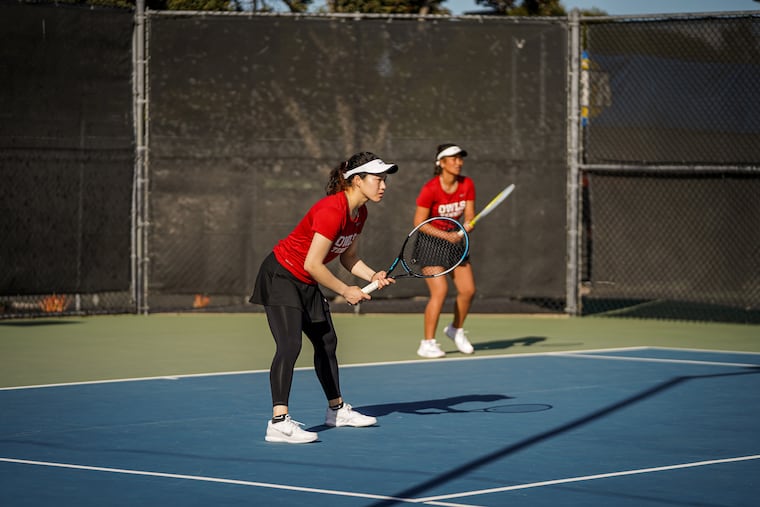Homesickness, language barriers, and a new culture forged the bond between these Temple tennis players
Temple has become a second home to international athletes on the tennis team, but it didn't happen quickly or without pangs of homesickness.

In 2019, senior Marin Delmas first visited Temple’s campus when he moved into his dorm room prior to the fall semester. Delmas moved from France to Philadelphia to play tennis after being recruited by the Owls.
His hometown of Lorient is vastly different compared to Philadelphia’s urban environment.
The foundation of the men’s and women’s tennis programs is talented international players of different backgrounds and cultures. All eight players on the 2023 men’s roster are from international countries. In comparison, the women’s roster comprises nine international and one American player.
The transition to the U.S. for most Temple players is drastic.
“It was very, very hard at the beginning,” Delmas said. “Even when coach [Steve Mauro] was talking about exercise [on] the court. At first, I was like, ‘I don’t understand anything, can you repeat [it]?’ ”
Mauro admires his international players. Over the course of time, most players learn English and adapt to Philadelphia.
Mauro is unable to watch recruits at international showcase tournaments due to the program’s budget. To overcome financial limitations, he uses alternative methods to scout them. He connects with recruiting agencies, evaluates wins and losses, physical traits, and character.
“I have been doing it for a while,” Mauro said. “I think at Temple we have been represented by probably 30 different countries, so I have contacts pretty much all over the world.”
This method has translated into great success. The men’s tennis program is 17-3, while the women’s program is 15-4 this season. The international doubles team of Jamie Wei and Maiko Uchijima ranks No. 27 in the nation by the Intercollegiate Tennis Association.
Sophomore Veronika Kulhava, who was born in the Czech Republic, learned English in school and from Netflix subtitles. Although Kulhava felt comfortable with English, she noticed the pronunciation of certain words changed in the U.S.
Kulhava experienced a new style of tennis when she first arrived at Temple. NCAA tennis is more team-oriented compared to the international version of the sport.
“I played from a [tennis] basket my whole life almost,” Kulhava said. “There was just a coach and he [would] just throw me balls, and I was just smacking it. But here we just practice with each other and we rotate.”
Kulhava describes assistant coach Frederika Girsang, who moved from Indonesia to play tennis at Western Michigan from 2000-2004, as the “parent” of the team.
Girsang noted first-year international players struggle with moving away from home.
“Some of these girls at the beginning get homesick,” Girsang said. “Some players from different countries have different time zones, so it is hard for them to keep in touch with their families.”
Junior Sena Takebe, who moved from Japan to Florida for a two-year stint during middle school, felt alone when she first moved. Takebe eventually came back to Japan to play tennis and later returned to the U.S. when she committed to Temple.
“When I was in Florida, it was really hard,” she said. “I was crying almost every day because I missed home so much. And I think that affected my tennis as well. I couldn’t really play well.”
Takebe and her teammates schedule team dinners and hold deep conversations to connect with each other. Outside of practice, the men bond over playing sports like soccer.
The commitment of a Division I athlete is significant and finding time outside of tennis requirements is almost impossible.
“Here you need to build a new life and new friends,” Kulhava said. “It is kind of hard to make the connection because you don’t really have time. You are at practice and in school. When you are in school, you just want to study. You don’t want to socialize. After this you go home and you sleep because you are too tired. It is kind of hard to make friends outside of the [tennis] team.”
Temple’s coaching staff is aware of these initial challenges for most of their players.
The goal is to create a family atmosphere for its international players who are new to the city.
“My door is always open, especially [to] the freshman,” Mauro said. “Besides seeing them, I will text them once or twice a week to make sure everything is going [well].”
» READ MORE: These doubles players are garnering national attention and ‘really put Temple tennis on the map’